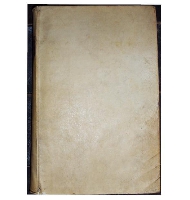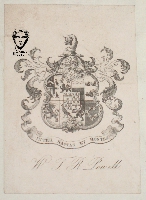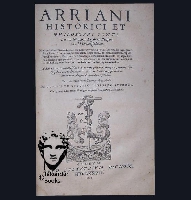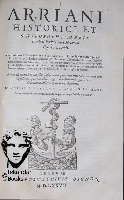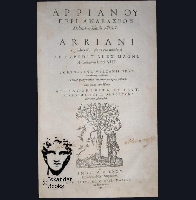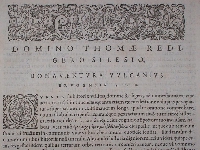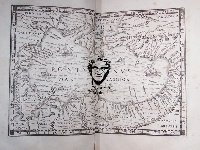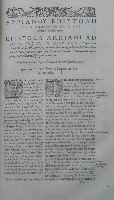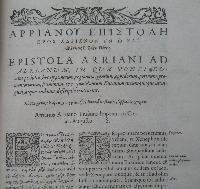De Expedit. Alex. Magni, Historiarum Libri VIII, (bound with:) Arriani historici et philosophi Ponti Euxini & maris Erythraei Periplus, ad Adrianum Caesarem
Year: 1575
Edition: First edition
Publisher: Henr. Stephanus
Category: Europe
1) De Expedit[ione] Alex[andri] Magni, Historiarum Libri VIII
Geneva, Henr. Stephanus (= Henri Estienne), 1575.
Folio. 6 ƒƒ, pp. 198 (pp. 91/92 repeated in pagination), pp. 1-46, blank [ƒ = d6], 47-68 ( pp. 54/55 repeated in pagination), 5 ƒƒ [index], 1 ƒ. Greek and Latin text printed in parallel columns. Printer's device on title page. Nice woodcut head – and tailpieces plus woodcut initials. Title page creased with a a small tear in the bottom margin and a name in old ink next to printer’s device.
2) Ponti Euxini & maris Erythraei Periplus, ad Adrianum Caesarem.
Geneva, apud Eustatium Vignon, 1577
In two parts with separate title pages; folio, 4 ƒƒ, double page map, 8 ƒƒ, pp 193 [pp. numbered 1-64, 64-67, 69;70;70; 50, 73-96, 96-132 (even nrs. on recto page), 117 (verso)-126(recto), 143(verso) – 179, 178, 181 - 190 (recto), 188 (verso) - 193], xxv, xxxiv, 109, 8 ƒƒ. Despite the page numbering in part 1, the text is complete; collation for this part as follows:
aj-aiiij [av-avi], bj-biiij [bv-bvi], cj-ciiij [cv-cvi], dj-diiij [dv-dvi], ej-eiiij [ev-evi], fj-fiiij [fv-fvi], gj-giiij [gv-gvi], hj-hiiij [hv-hvi], ij-iiiij [iv-ivi], jj-jiiij [jv-jvi], kj-kiiij [kv-kvi], lj-liiii [lv-lvi], mj-miiij [mv-mvi], nj-niiij [nv-nvi], oj-oiiij [ov-ovi], pj-piiij [pv-pvi], qj-qiiij [qv-qvi], rj-rij [riii-riv], sj-sij [siii-siv], tj-tij [tiii-tiv], vj-vij [viii-viv].
Fold in upper corner of page 81, 4 cm closed tear in the bottom margin of the woodcut map of the Black Sea, just affecting the map itself, but without any loss..The editio princeps of the Greek text.
The whole bound in later (18th century) vellum with a gilt, red morocco label. On the front pastedown there is the armorial bookplate of William Thomas Rowland Powell (1815 - 1878) of Nanteos Mansion, Cardiganshire, with his motto "Inter hastas et hostes". He was a conservative politician who served as Member of Parliament for Cardiganshire from 1859 until 1865.
Arrian (c. A.D. 90-170), an Asiatic Greek, was a disciple of the slave-philosopher Epictetus,a friend of the cultured emperor Hadrian, a successful general and an active public servant. The first of these two books contains his eight-book History of Alexander the Great; although written some 450 years after Alexander’s death, this is considered the most reliable ancient life of Alexander because of Arrian’s careful use of sources.
Book 8, a deliberate imitation of the style of Herodotus, describes the real or imagined wonders of India. The Latin translation is by Bonaventura de Smed of Bruges, who conceals his humble patronymic (‘Smith’) in the high-sounding name of Vulcanius, derived from the smith-god of the Romans. In his preface he gives a hilarious account of the only previous translation, a desperately amateur effort by the Italian Bartolommeo Fazio (c. 1430); at one point Fazio transforms Arrian’s description of King Porus’s elephants, ‘they turned on their heels and fled’, into ‘they ran away on their hind legs’ (‘He thought they were bears perhaps?’ is Vulcanius’s dry comment). Also included are Plutarch’s life of Alexander and his discussion whether Alexander’s achievements resulted from good fortune or from his own merit. The great French scholar-printer Henri Estienne not only published the volume but helped Vulcanius with some alternative readings.
The second volume is based on Arrian’s account of his voyage round the Black Sea coast.
Click on a picture to enlarge.

